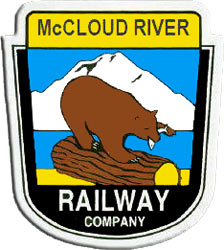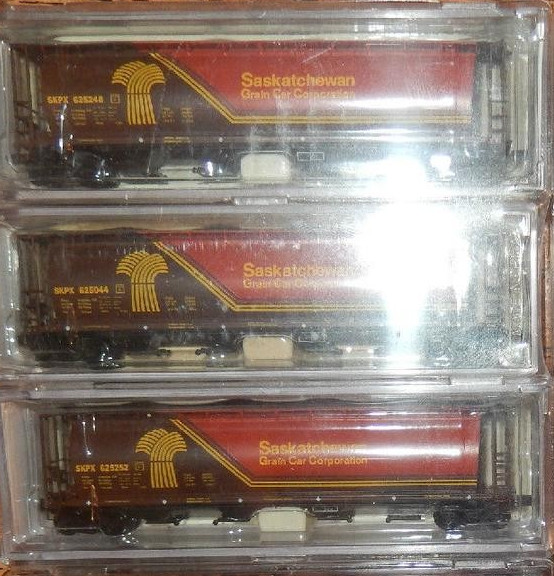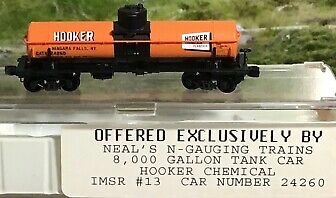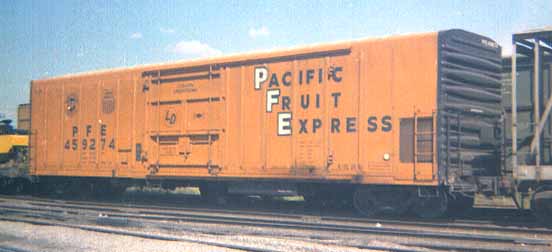Specific Item Information: This McCloud River 50’ boxcar is equipped with with Barber trucks. Headquartered in McCloud, California, the McCloud River Railroad interchanged with the Southern Pacific and Union Pacific and operated from 1897 until 2009. Primarily a lumber/timber railroad, the McCloud once had over 1000 railcars, and had regular passenger service until 1952.
Model Information: Boxcar, 50 Foot, Double Plug Door, Without Roofwalk
Prototype History: While the 40-foot boxcar was a standard design, and it did come in different setups depending on the type of freight being transported, it was not large enough for efficient mass commodity transportation. The 50-foot boxcar made its first appearance in the 1930s and steadily grew in popularity over the years, which further improved redundancies by allowing for even more space within a given car. Today, the 50-footer remains the common boxcar size. After the second world war ended, and steel became once again readily available, steel became the go-to choice for construction of boxcars. Pullman Standard and ACF were some of the most prolific builders of these cars.
These cars came in many variations. For instance, double-doors became practical for large/wide loads, end-doors useful for very large lading such as automobiles, and interior tie-down equipment was helpful in keeping sensitive products from being damaged in-transit. In 1954 the Santa Fe developed its "Shock Control" (and later "Super Shock Control") technology for new boxcars with upgraded suspension systems to further improve the ride-quality and reduce the chance of damaging freight.
In the 1960s, the flush, "plug" style sliding door was introduced as an option that provides a larger door to ease loading and unloading of certain commodities. The tight-fitting doors are better insulated and allow a car's interior to be maintained at a more even temperature.
These cars came in many variations. For instance, double-doors became practical for large/wide loads, end-doors useful for very large lading such as automobiles, and interior tie-down equipment was helpful in keeping sensitive products from being damaged in-transit. In 1954 the Santa Fe developed its "Shock Control" (and later "Super Shock Control") technology for new boxcars with upgraded suspension systems to further improve the ride-quality and reduce the chance of damaging freight.
In the 1960s, the flush, "plug" style sliding door was introduced as an option that provides a larger door to ease loading and unloading of certain commodities. The tight-fitting doors are better insulated and allow a car's interior to be maintained at a more even temperature.
Road Name History:  The MCR was originally built as the McCloud River Railroad chartered on January 22, 1897, as a forest railway bringing logs to the company sawmill on the Southern Pacific Railroad at a place called Upton a few miles north of Mount Shasta, California. By 1901 the company sawmill was moved to McCloud, and the distance for hauling lumber produced at McCloud was reduced to 17.8 miles (28.6 km) by shifting the junction south to Mount Shasta in 1906. The locomotives shifted from wood to oil fuel as the railroad extended into the forests east of McCloud in 1907. Trains brought logs to the McCloud sawmill from the east, and carried lumber from the sawmill west to the Southern Pacific.
The MCR was originally built as the McCloud River Railroad chartered on January 22, 1897, as a forest railway bringing logs to the company sawmill on the Southern Pacific Railroad at a place called Upton a few miles north of Mount Shasta, California. By 1901 the company sawmill was moved to McCloud, and the distance for hauling lumber produced at McCloud was reduced to 17.8 miles (28.6 km) by shifting the junction south to Mount Shasta in 1906. The locomotives shifted from wood to oil fuel as the railroad extended into the forests east of McCloud in 1907. Trains brought logs to the McCloud sawmill from the east, and carried lumber from the sawmill west to the Southern Pacific.
The railroad remained primarily a logging railroad with several different owners over the following years including: U.S. Plywood Corporation (1963), U.S. Plywood-Champion Papers (1969), Champion International (1972), and Itel Corporation (1977). The railroad was sold to Jeff E. and Verline Forbis (4-Rails, Inc.) on July 1, 1992. On June 28, 2005, the railroad petitioned the STB to abandon most of its line. Service on all line east of the McCloud Sawmill (now abandoned) has been terminated. A small section of line between McCloud CA and Mount Shasta CA remained open briefly for excursion and dinner train service. As timber demand declined, the railroad slowly cut back although new ownership also led to its downfall. In 2009, the railroad ceased operation and closed down. The property is now for sale as a rail/trail as of 2012.
From Wikipedia

The railroad remained primarily a logging railroad with several different owners over the following years including: U.S. Plywood Corporation (1963), U.S. Plywood-Champion Papers (1969), Champion International (1972), and Itel Corporation (1977). The railroad was sold to Jeff E. and Verline Forbis (4-Rails, Inc.) on July 1, 1992. On June 28, 2005, the railroad petitioned the STB to abandon most of its line. Service on all line east of the McCloud Sawmill (now abandoned) has been terminated. A small section of line between McCloud CA and Mount Shasta CA remained open briefly for excursion and dinner train service. As timber demand declined, the railroad slowly cut back although new ownership also led to its downfall. In 2009, the railroad ceased operation and closed down. The property is now for sale as a rail/trail as of 2012.
From Wikipedia
Brand/Importer Information: Micro-Trains is the brand name used by both Kadee Quality Products and Micro-Trains Line. For a history of the relationship between the brand and the two companies, please consult our Micro-Trains Collector's Guide.
Manufacturer Information:  Micro-Trains Line split off from Kadee Quality Products in 1990. Kadee Quality Products originally got involved in N-Scale by producing a scaled-down version of their successful HO Magne-Matic knuckle coupler system. This coupler was superior to the ubiquitous 'Rapido' style coupler due to two primary factors: superior realistic appearance and the ability to automatically uncouple when stopped over a magnet embedded in a section of track. The success of these couplers in N-Scale quickly translated to the production of trucks, wheels and in 1972 a release of ready-to-run box cars.
Micro-Trains Line split off from Kadee Quality Products in 1990. Kadee Quality Products originally got involved in N-Scale by producing a scaled-down version of their successful HO Magne-Matic knuckle coupler system. This coupler was superior to the ubiquitous 'Rapido' style coupler due to two primary factors: superior realistic appearance and the ability to automatically uncouple when stopped over a magnet embedded in a section of track. The success of these couplers in N-Scale quickly translated to the production of trucks, wheels and in 1972 a release of ready-to-run box cars.
Micro-Trains Line Co. split off from Kadee in 1990 to form a completely independent company. For this reason, products from this company can appear with labels from both enterprises. Due to the nature of production idiosyncrasies and various random factors, the rolling stock from Micro-Trains can have all sorts of interesting variations in both their packaging as well as the products themselves. When acquiring an MTL product it is very important to understand these important production variations that can greatly enhance (or decrease) the value of your purchase.
Please consult our Micro-Trains Collector's Guide

Micro-Trains Line Co. split off from Kadee in 1990 to form a completely independent company. For this reason, products from this company can appear with labels from both enterprises. Due to the nature of production idiosyncrasies and various random factors, the rolling stock from Micro-Trains can have all sorts of interesting variations in both their packaging as well as the products themselves. When acquiring an MTL product it is very important to understand these important production variations that can greatly enhance (or decrease) the value of your purchase.
Please consult our Micro-Trains Collector's Guide
Item created by: CMK on 2023-02-01 04:24:25. Last edited by CMK on 2023-02-01 04:24:26
If you see errors or missing data in this entry, please feel free to log in and edit it. Anyone with a Gmail account can log in instantly.
If you see errors or missing data in this entry, please feel free to log in and edit it. Anyone with a Gmail account can log in instantly.









